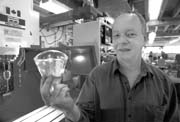

Steve Kecani: More than a job
Steve Kecani isn't the kind of man to count hours. Actually, it isn't rare that the supervisor of the Department of Physics machine shop will stay long after his shift is over, even come in on weekends, if a colleague or student needs his help. "To me this isn't a job," he says matter-of-factly, after settling in his office in the basement of the Rutherford Physics Building next to his workshop. "I like it so much, it's more like a hobby."
It's this kind of devotion to his work that has earned Kecani an Award of Excellence in Service from the Faculty of Graduate Studies and Research. The other staffer to be honoured with the prize this year is Giovanna Locascio, the Department of Psychology's graduate program secretary (more about her in the fall when we resume publishing).
Kecani is rather self-effacing about the honour. "I don't feel I deserve it," he humbly says. "I think it should be given to everyone in this machine shop, since everything we do is a group effort."
He calls the University "a great place to work" that he would not give up -- despite being periodically solicited by the private sector with its promises of higher wages. "This job isn't about money," he says, machinery purring in the background and the faint smell of oil permeating the air. "I'm proud to be a part of McGill. I also enjoy that my job is always different and it allows me contact with students."
The 52-year-old joined the University's Foster Radiation Laboratory as a machinist in 1969. The lab merged with the physics machine shops in 1992. He has been supervisor since 1994 and won an Award of Excellence from the Faculty of Science in 1995.
Kecani helps faculty and students design and build the equipment they need in order to do their experiments. He draws praise, not only for his skills as a machinist, but for his ability to teach others how to build things for themselves.
Kecani encourages students to use his shop. These students aren't just from his department, but also from other faculties like engineering and dentistry. He says they need to acquire hands-on experience before going into the work force. "They'll soon become the scientists, professors and decision-makers of tomorrow," he says. "It's important for them to learn how machines work so they have an idea of what they're talking about."
He is also known to relish a challenge and help students find solutions to their problems. This kind of support, says Philip LeBlanc, president of the McGill Graduate Association of Physics Students, makes Kecani "an invaluable resource for many physics graduate students."
Professor Anthony Williams-Jones, chair of the Department of Earth and Planetary Sciences, says Kecani far exceeds what is expected of him and has displayed "quality workmanship that I have rarely seen anywhere." Kecani, he adds, "is brimful of ideas and has an infectious enthusiasm which allows one to believe that nothing is impossible."
Professor Jean Barrette, chair of the Department of Physics, credits Kecani with improving facilities at the physics machine shop. "Due to Steve's efforts and vision, the potential for our shop has dramatically increased," he says, noting that this effort is the reason the shop can service other departments, too. He describes Kecani as "an intelligent and accomplished machinist, who has always taken great interest in students and their projects."
Kecani is also known at McGill for organizing social events, including an annual corn roast at his farm in St. Bernard de la Colle, near Hemmingford, where geese frolic on one of three ponds. The event drew about 200 students, friends and colleagues last year.
Dedicating himself to his job, Kecani says, is not about winning praise from staff and students; his work gives him a raison d'être. "I'm not married and I don't have kids," he says. "In a way, this shop is like my family."
Sylvain-Jacques Desjardins
| 


